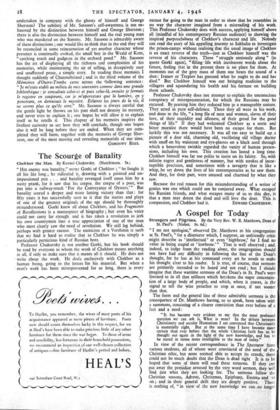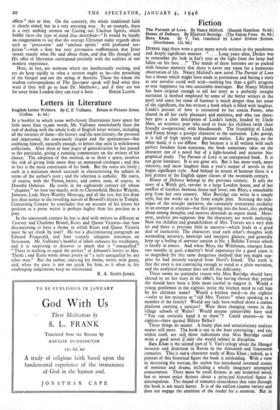A Gospel for Today
Strangers and Pilgrims. By the Very Rev. W. R. Matthews, Dean of St. Paul's. (Nisbet. 8s. 6d.) " I no not apologise," observed Dr. Matthews to his congregation at St. Paul's, " for a discourse which, I suppose, an unfriendly critic might describe as `intellectual' or even highbrow,' for I find no value in being stupid or 'lowbrow.'" That is well observed ; and, indeed, to judge from the reading alone, the congregation should not have had any difficulty in following the line of the Dean's thought, for he has at his command every art he needs to make his thought clear to his reader. It is true, of course, that sermons are primarily intended to be heard and not read ; but I should imagine that these wartime sermons of the Dean's in St. Paul's were listened to in all that stillness which betokens the eager concentra- tion of a large body of people, and which, when it ceases, is the signal to tell the wise preacher to stop at once, if not sooner than that.
The form and the general line of these admirable sermons is the consequence of Dr. Matthews having, so to speak, been taken with a summons, consisting of a clearer conviction than ever before of a fact and a need: "It has become very evident to me that the most profound question we can ask is, What is man? In the debate between Christianity and secular Humanism I am convinced that Christianity is essentially right. But at the same time I have become more certain than ever before that the whole Christian faith has to be thought out again in the light of the new knowledge, and has to be stated in terms more intelligible to the man of today."
In view of the recent correspondence in The Spectator front various students, all of whom were convinced of the need of the Christian ethic, but none seemed able to accept its creeds, there could not be much doubt that the Dean is dead right It is to be hoped that some ,of them will read these sermons. If they can put away the prejudice aroused by the very word sermon, they will find just what they are looking for. The sermons follow the Christian seasons, Advent, Christmas, Epiphany, Easter, and so on ; and in their general drift they are deeply positive. There is nothing of, " in view of the new knowledge we can-no longer
affirm " this or that. On the contrary, the whole traditional faith is clearly stated, but in a very arresting way. As an example, there is a very striking sermon on Casting out Unclean Spirits, which boldly faces the type of mind thus described—" It would be hardly an exaggeration to say that the average Christian today regards ideas such as ' possession' and ' unclean spirits ' with profound sus- picion "—with a firm but very persuasive reaffirmation that Jesus meant exactly what He said about them, and that His thought and His offer of liberation correspond precisely with the realities of our modern experience. Here, in fact, are sermons which are intellectually exciting, and yet do keep rigidly to what a sermon ought to be—the preaching of the Gospel and not the airing of theories. Those for whom the student correspondents of The Spectator speak will find what they want if they will go to hear Dr. Matthews ; and if they are too
far away from London they can read it here. ROGER LLOYD.
































 Previous page
Previous page